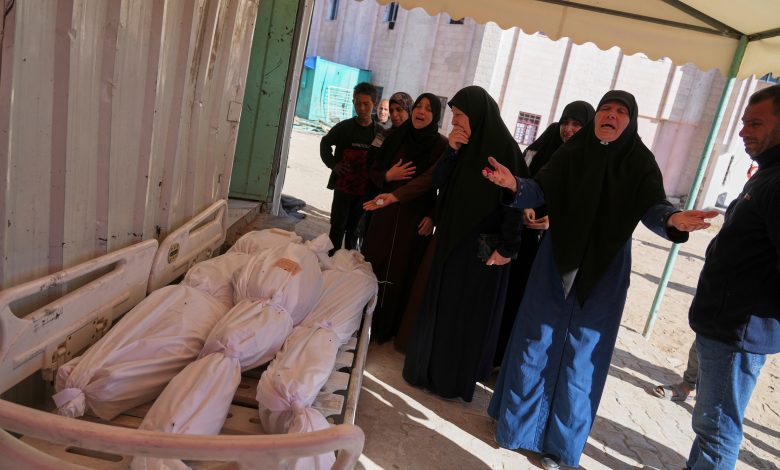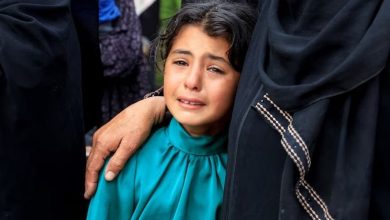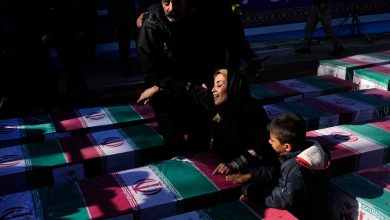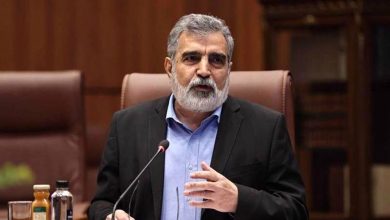Humanitarian Crisis Emerges as 2 Million Remain Trapped in Gaza
The United Nations has issued a warning as more than 2 million individuals continue to be trapped in Gaza, facing increasingly dire conditions. With critical aid supplies dwindling and infrastructure on the brink of collapse, there is a rising concern over growing mental health needs due to the sustained Israeli blockade.

The United Nations reported Thursday that over 2 million individuals are still confined within the Gaza Strip, raising alarms about a worsening humanitarian crisis. This situation is exacerbated by continuous Israeli attacks and a blockade that has prevented aid from reaching the area since the beginning of March.
More than 2 million individuals are currently confined within Gaza, as sustained conflict and decreasing availability of aid are exacerbating stress, particularly among children, with mental health necessities intensifying daily, UN spokesperson Stephane Dujarric reported, referencing the Office for the Coordination of Humanitarian Affairs (OCHA), according to Anadolu.
The humanitarian situation in Gaza has deteriorated rapidly following a comprehensive blockade on goods by “Israel” that began on March 2. Dujarric has cautioned that the present levels of assistance are dangerously insufficient, posing severe risks to public health and the survival of civilians.
The blockade has had a pronounced effect on critical infrastructure, with significant damage reported in the water sector. According to Dujarric, almost 90% of Gaza’s water facilities have been impacted by the continuing conflict.
The United Nations has reported a significant rise in mental health issues among children in the enclave, who are disproportionately affected by forced displacement, massacres, and resource shortages. The escalating stress levels are closely linked to the worsening living conditions, further intensifying the crisis.
In a reaffirmation of the United Nations’ stance on international law, spokesperson Stéphane Dujarric emphasized Israel’s responsibilities as an occupying power. He stated that Israel holds clear obligations under international law to ensure the availability of essential supplies such as food and medical aid, and to support humanitarian relief efforts when necessary provisions are not otherwise accessible.
The United Nations has drawn attention to the escalating crisis in Gaza, while simultaneously addressing the persistent displacement occurring in the occupied West Bank. In the northern regions, numerous residents have been compelled to evacuate amid ongoing Israeli military actions, leaving them unable to return to their homes.
The humanitarian crisis in Gaza intensifies in 2025 as Israel reinforces its blockade and persistent bombardments continue. The United Nations is persistently urging for urgent access to humanitarian aid and compliance with international humanitarian laws.
The humanitarian situation in Gaza worsens as the United Nations Office for the Coordination of Humanitarian Affairs (OCHA) reports that approximately 500,000 Palestinians have been forced from their homes since March 18. The region is grappling with increasing difficulties amidst this crisis.
In a Thursday statement, the OCHA reported that the majority of the newly displaced persons had already been compelled to flee several times before the temporary ceasefire initiated on January 19. This recurring pattern of displacement has greatly exacerbated civilian suffering and pushed Gaza’s already delicate humanitarian infrastructure to its limits.
The agency has issued a warning about the enduring hostilities in the Gaza Strip, highlighting their catastrophic impact on civilians. The effects include loss of life, displacement, and the destruction of crucial infrastructure.
In mid-March, Israel recommenced its aerial bombardment campaign, resulting in a fresh wave of mass displacement. Relief workers report that numerous displaced individuals are without adequate shelter, with families in towns such as Bani Suheila resorting to fabric scraps and blankets to endure the persistent airstrikes.
The ongoing displacement of Palestinians is exacerbating the current crisis, as many of the 500,000 individuals newly displaced since October 2023 have been forced to relocate several times. This situation underscores the cyclic and cumulative impact of sustained Israeli military actions in Gaza.
The Office for the Coordination of Humanitarian Affairs (OCHA) has expressed strong disapproval over significant restrictions on humanitarian access. In its recent report, the agency highlighted that on the day in question, Israeli authorities permitted only two out of six planned aid missions to proceed. According to OCHA, four additional missions were denied, including a crucial effort designed to transport fuel from Rafah, although further specifics were not provided.
According to the agency, ongoing limitations on the delivery of humanitarian aid—including food, fuel, shelter, and medical supplies—have exacerbated the crisis in Gaza. Since March, Israeli authorities have obstructed the entry of crucial goods, undermining efforts to stabilize the area.
A recent United Nations report has underscored a significant increase in severe malnutrition within Gaza, with children being the most affected demographic. In March, the provision of supplemental nutrition to children saw a precipitous decline of over two-thirds due to impeded relief efforts, hampered by border shutdowns and logistical challenges.
Gaza’s healthcare infrastructure is on the brink of collapse as Israeli restrictions severely hinder efforts to supply hospitals with essential medical supplies, according to a recent report. Medical facilities, currently overwhelmed by a surge of injuries, are now confronted with acute shortages of both equipment and medication.
UN experts and human rights organizations have expressed increasing concern over the deepening displacement and deterioration of essential services, characterizing “Israel’s” policies as part of an expansive effort to depopulate Gaza. These actions have prompted some to caution that such measures might constitute a genocidal policy intended to facilitate occupation of the area.







